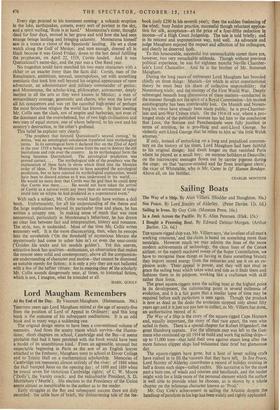Cortes and Montezuma
Cortes and Montezuma. By Maurice Collis. (Faber. 15s.) ' BECAUSE they alone believed the incredible,' Manuel Machado's famous sonnet on the Conquistadores begins, 'it came true.' And in the case of Mexico this was no more than solid fact. It was incredible that Cortes should conquer a great empire, one of the most advanced civilisations of its day, with 500 men, fourteen cannon, and sixteen horses justthat, and no reserves or provisions. Yet so confident Was he that on landing he ran all his ships aground and cut off finally ell hope of escape. It 'was equally incredible that a string of coin- cidences should justify his coming and make him be taken for a god; Yet, in effect, he did bring a new god to Mexico. As Mr. Collis
Writes:
It is hard to say which of the two protagonists was the more mysterious: Montezuma awaiting the god, Cortes approaching with the Cross. Neither understood the other, yet in effect their thought was analogous.
Quetzalcoatl (Lawrence's plumed serpent), most beautiful and Most compassionate of all the gods, lived on earth, it was believed, as a man, preached against the human sacrifice that was the basis of all Mexican worship, was driven out, and prophesied his return: I will return in a One Reed year and re-establish my rule. It will be a time of great tribulation for the people. About this coming the prophecies were precise. He would come in a strange vessel from the east, landing on his name-day; his skin Would be fair, his beard full and black, his clothes and hat black— altogether an extraordinary appearance for those parts. 1363 had Every sign pointed to his imminent coming: a volcanic eruption In the lake, earthquakes, comets, every sort of portent in the sky, and a spirit wailing, 'Ruin is at hand.' Montezuma's sister, thought dead for four days, revived in her grave and told how she had seen strange beings landing and bringing calamity. Montezuma himself saw in a trance a vision of the Spaniards' landing. He set a close watch along the Gulf of Mexico; and sure enough, dressed all in black because it was Good Friday, down to the last detail fulfilling the prophecies, on April 22, 1519, Cortes landed. And it was Quetzalcoatl's name-day, and the year was a One Reed year.
No tragedian could have matched his two main characters with a richer or an exacter irony than the facts did: Cortes, man of the Renaissance, ambitious, sensual, unscrupulous, yet with something messianic that took him well beyond his original appearance of mere adventurer, an administrator and military commander of genius; and Montezuma, the scholar-king, philosopher, astronomer, deeply learned in all the arts as they were known in Mexico; a man of extraordinary courage, generosity and charm, who won the love of all his conquerors and was yet the cannibal high-priest of perhaps the most ferocious religion the world has known. In their meeting Mr. Collis sees the clash, not of empire and barbarian, not even of the dominant and the overwhelmed, but of two high civilisations and two men of equal stature, one of whom believed, to his own and his country's destruction, in the other's godhead.
This belief he explains very clearly:
`The prophecy that foretold Quetzalcoatl's second coming,' he writes, `was an astrological calculation translated into mythological terms. In its astrological form it declared that on the 22nd of April in the year 1519 a being would come from the east to destroy the old institutions and rule over the country. In its mythological form the being becomes Quetzalcoatl. The astrological prediction was proved correct.... The mythglogical side of the prophecy was the explanation of these facts in terms which fitted into the Mexican order of ideas. For Montezuma to have accepted the astrological prediction, but to have rejected its mythological explanation, would have been to discard science as it was understood in his world.... He would no more deny that Cortes was the god than he could deny that Cortes was there.... He would not have taken the arrival of Cortes as a natural event any more than an astronomer of today could take an eclipse he had predicted as a supernatural event.'
With such a subject, Mr. Collis would hardly have written a dull book. Unfortunately, for all his understanding of the theme and the large implications beyond its particular time and place, he has written a scrappy one. In making sense of much that was once nonsensical, particularly in Montezuma's behaviour, he has drawn no clear line between fact and interpretation, history and romance. The style, too, is undecided. Most of the time Mr. Collis writes extremely well. It is the more disconcerting, then, when he swoops into the novelettish (`On the threshold of mysterious Mexico she mysteriously had come to usher him in') or even the near-comic ('Golden his socks and his sandals golden'). Yet this uneven, attractive book has qualities—enthusiasm, an observation that makes the remote seem solid and contemporary, above all the compassion- ate understanding of character and motive—that cannot be dismissed as suitable merely for fiction; it is only a pity they are not ballasted with a few of the heftier virtues: for in steering clear of the scholarly Mr. Collis sounds dangerously near, at times, to historical fiction, which is not, I imagine, what he intended at all.
ISABEL QUIGLY



































 Previous page
Previous page